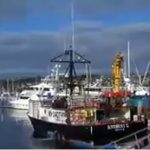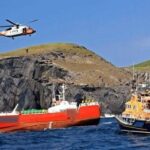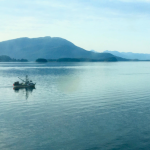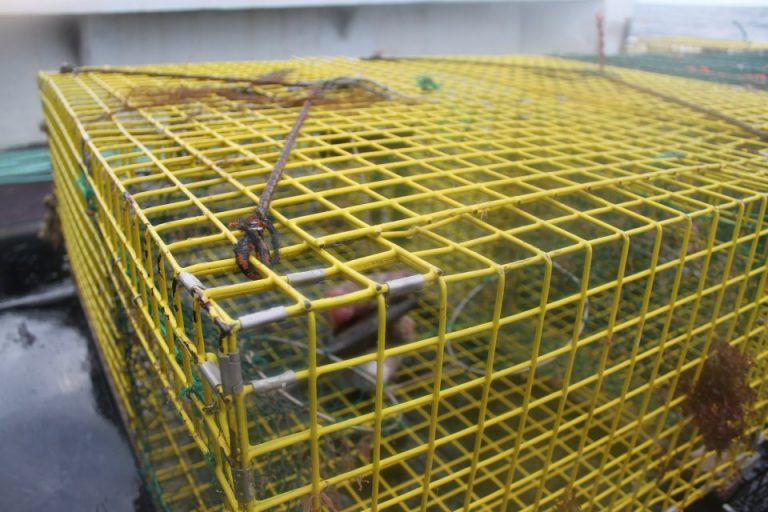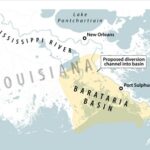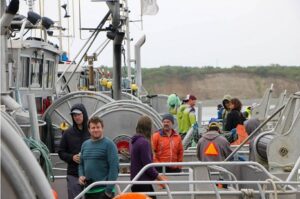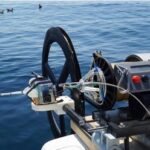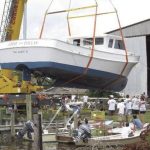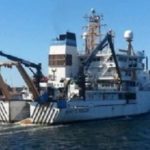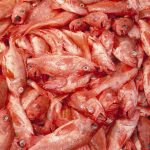Tag Archives: Maine Center for Coastal Fisheries
More alewives swim up the restored Bagaduce watershed
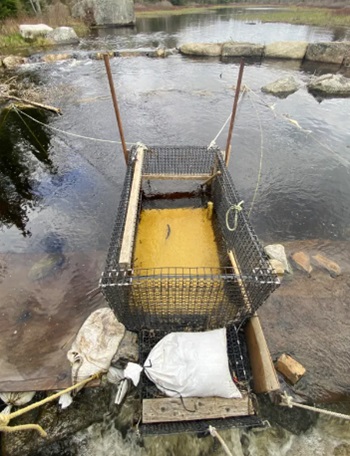 More than two years after the completion of multiple fish passage projects in western Hancock County, the effort appears to be paying off as alewives swim in greater numbers up the Bagaduce River watershed each spring. Those and other projects have contributed to a resurgence in the upstream migration of alewives, which are a key food supply for bigger wildlife, as well as a growing source of income for Maine fishermen who sell them as food or springtime lobster bait. From 2017 through 2021, the towns of Penobscot, Sedgwick and Brooksville worked with conservation groups to remove barriers that prevented fish from migrating between the tidal Bagaduce River and five ponds in its watershed. The idea was to help restore runs for fish, especially alewives, that travel upstream from Penobscot Bay and reproduce in the ponds more, >>CLICK TO READ<< 14:55
More than two years after the completion of multiple fish passage projects in western Hancock County, the effort appears to be paying off as alewives swim in greater numbers up the Bagaduce River watershed each spring. Those and other projects have contributed to a resurgence in the upstream migration of alewives, which are a key food supply for bigger wildlife, as well as a growing source of income for Maine fishermen who sell them as food or springtime lobster bait. From 2017 through 2021, the towns of Penobscot, Sedgwick and Brooksville worked with conservation groups to remove barriers that prevented fish from migrating between the tidal Bagaduce River and five ponds in its watershed. The idea was to help restore runs for fish, especially alewives, that travel upstream from Penobscot Bay and reproduce in the ponds more, >>CLICK TO READ<< 14:55
Maine researchers, students are sorting through muck and slugs to study baby scallops
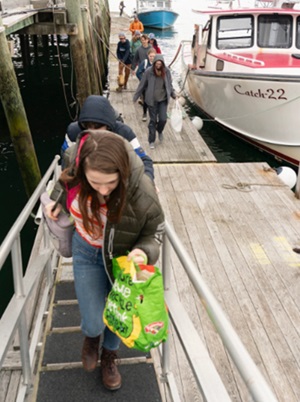 People from each of these groups are collaborating with the Maine Center for Coastal Fisheries, Hurricane Island Center for Science and Leadership and Colby College in the second year of a study meant to help identify how many young scallops there are off Maine’s coast, and where they’re living. The tiny, two-shelled juveniles, or spat, are uniquely important to fishermen who scoop wild scallops from the ocean floor and aquaculture farmers who raise them in contained areas. Unlike most aquaculture farmers who work with other species, scallop farmers can only grow their bounty from wild spat – the same spat that wild scallop fishermen need to feed the general population. Photos, more, >>click to read<< 12:50
People from each of these groups are collaborating with the Maine Center for Coastal Fisheries, Hurricane Island Center for Science and Leadership and Colby College in the second year of a study meant to help identify how many young scallops there are off Maine’s coast, and where they’re living. The tiny, two-shelled juveniles, or spat, are uniquely important to fishermen who scoop wild scallops from the ocean floor and aquaculture farmers who raise them in contained areas. Unlike most aquaculture farmers who work with other species, scallop farmers can only grow their bounty from wild spat – the same spat that wild scallop fishermen need to feed the general population. Photos, more, >>click to read<< 12:50
Maine lobstermen signal opposition to participating in ropeless testing program
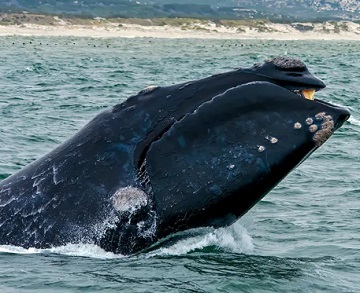 Maine lobstermen are signaling their hesitation to participate in a multimillion-dollar program the state is launching to test new ropeless technology that the federal government soon may require to protect the endangered North Atlantic right whale. Lobstermen have been largely unhappy with the regulations, fearing that the regulations will destroy the lobstering industry as they know it. Maine’s congressional delegation succeeded in securing legislative approval for a reprieve that stalls the regulations from going into effect until Jan. 1, 2029. Industry groups also have succeeded in taking NOAA to court, where the regulations are still tied up. Even so, the clock is ticking and the Department of Marine Resources wants to be prepared for what it expects is an inevitable regulation. more, >>click to read<< 06:31
Maine lobstermen are signaling their hesitation to participate in a multimillion-dollar program the state is launching to test new ropeless technology that the federal government soon may require to protect the endangered North Atlantic right whale. Lobstermen have been largely unhappy with the regulations, fearing that the regulations will destroy the lobstering industry as they know it. Maine’s congressional delegation succeeded in securing legislative approval for a reprieve that stalls the regulations from going into effect until Jan. 1, 2029. Industry groups also have succeeded in taking NOAA to court, where the regulations are still tied up. Even so, the clock is ticking and the Department of Marine Resources wants to be prepared for what it expects is an inevitable regulation. more, >>click to read<< 06:31
NFWF grants support Maine lobster industry participation in alternative fishing gear testing
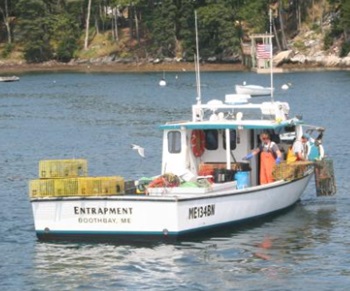 “Alternative gear, also known as “on demand” gear is a long way from being viable for fishermen or for whales,” said DMR Commissioner Patrick Keliher. “It is my goal to make sure we know what gear works, and more importantly what doesn’t work, so when future draft federal regulations come forward, we can draw on the real-world experience of fishermen when determining what the next steps should be.” One award of $1,999,992 will support the evaluation of acoustic geolocation systems that locate gear on the bottom without the benefit of surface buoys which are part of traditional gear configurations. Regional partners will include the Island Institute, Maine Center for Coastal Fisheries, Maine Coast Fishermen’s Association, the Sunrise County Economic Council, and the Gulf of Maine Lobster Foundation. more, >>click to read<< 06:09
“Alternative gear, also known as “on demand” gear is a long way from being viable for fishermen or for whales,” said DMR Commissioner Patrick Keliher. “It is my goal to make sure we know what gear works, and more importantly what doesn’t work, so when future draft federal regulations come forward, we can draw on the real-world experience of fishermen when determining what the next steps should be.” One award of $1,999,992 will support the evaluation of acoustic geolocation systems that locate gear on the bottom without the benefit of surface buoys which are part of traditional gear configurations. Regional partners will include the Island Institute, Maine Center for Coastal Fisheries, Maine Coast Fishermen’s Association, the Sunrise County Economic Council, and the Gulf of Maine Lobster Foundation. more, >>click to read<< 06:09
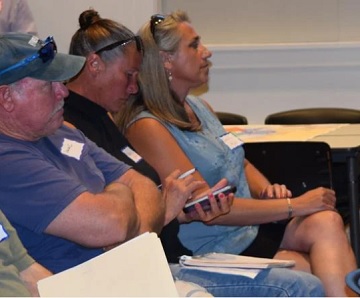
Maine Fishermen, scientists find flaws in potential wind energy lease areas
BOEM officials called the meeting to review newly released draft maps of where federal leases could be offered in the Gulf of Maine, known as the “call” area. They wanted fishermen’s feedback to see where the maps fell short based on what fishermen know from working on the water. “This is very difficult for our industry to face,” said Dustin Delano, New England Fishermen Stewardship’s chief operating officer, former vice president of the Maine Lobster Association and a fourth-generation lobsterman out of Friendship. “A lot of us feel this is going to wipe us off the map.” The fishermen present were unconvinced but resigned. >click to read< 07:55
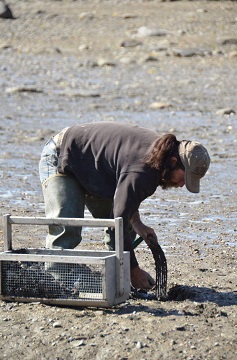
Harvesters at high risk for injury, but avoid doctors
Stooped over a 5-gallon bucket while wielding a clam rake in heavy, wet sand left by a receding tide? It’s hard work, but that’s where the clams are. The same holds true for hauling traps from the bottom of the ocean floor onto a lobster boat – if you want to sell lobsters. The Downeast Health Research Collaborative conducted a harvester health study led by Dr. Tora Johnson, a University of Machias professor who comes from a family of Downeast fishermen. The connection between injuries and pain and substance misuse is well known, but among fishery harvesters, the risk is high. “Chronic pain is the driver for most opioid use and misuse,” student Lauren Sachs said at the Northern Light Health symposium. To compound the issue, harvesters are self-employed and often are uninsured or underinsured for health care. >click to read< 18:39
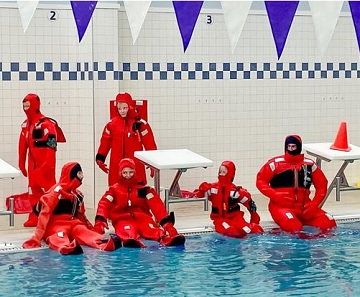
Middle school lobstermen take survival training
On May 26, a group of 10 middle schoolers gathered for a U.S. Coast Guard-certified drill conductor training session at the Blue Hill YMCA/Lawrence Fitness Center. The kids, whose ages ranged from 9 to 13, are all residents of Deer Isle or Stonington and have student lobster licenses. (The minimum age for a student lobster and crab fishing license is 8). The training session started in a classroom on Wednesday, where the kids learned about fire extinguishers, flares and other safety measures, before moving poolside Thursday. This training is unique in that it is “one of the only programs in Maine to target middle school aged lobstermen,” said Matt Montgomery. Photos, >click to read< 08:40

The Maine lobster fishery is coming off a record year, faces challenges ahead
Maine’s lobster fishery scored a record-breaking value in 2021, with a 75% increase over 2020 and a 10% increase in landed weight. But fishermen face increasing pressures, including difficulty finding and keeping crew, rising operational costs, competition for fishing grounds from other industries, new regulations affecting fishing gear and methods and coastal development pressure that’s squeezing waterfront access and opportunities to live they work. >click to read< 09:25
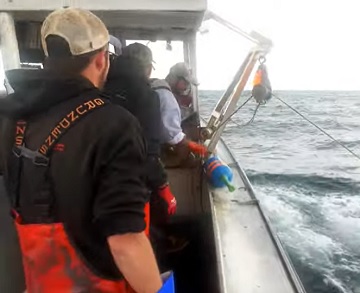
Save the Gulf of Maine – The Maine Reset, Ep. 4: Never Forgotten
Derek Colbeth grew up lobstering, and then served for 5 years in the US Marine Corps. Now he’s a civilian again, but his heritage and livelihood is under attack on all fronts. Powerful interests are converging in a war against Maine Lobstermen. If Lobstermen lose this fight, Maine will never be the same. >Video, click to watch< 14:35
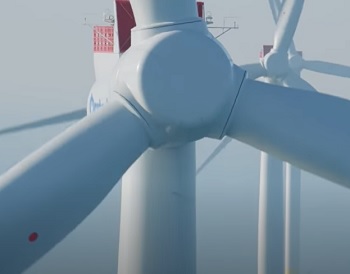
Save the Gulf of Maine – The Maine Reset, Ep.3: This is an Experiment
In this episode, interviews with two brilliant people that you won’t want to miss regarding offshore wind development in Maine. Carla Guenther PhD brings an oceanography perspective, and Long Island Commercial Fisherman Steve Train lays out some practical wisdom as only a fisherman can. Sandwiched in there are some of my own antics lampooning the empty suits from corporations who want to confiscate our ocean., >Video, click to watch< 13:15 ocean industrialization
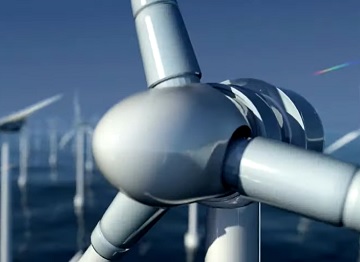
Save the Gulf of Maine – The Maine Reset Part 2, Fait Accompli?
First, we look at a basic chronology of the interplay between the State of Maine, the University of Maine, and private entities RWE Renewables and Diamond Offshore Wind (subsidiary of Mitsubishi) as they have joined forces in a venture of enormous importance. They partnered on a prototype of future wind turbines (Aqua Ventus I). Then they began working on an array of a dozen turbines. How many more turbines will follow? The wind developers have been clear that the first array is only the beginning of industrializing the Gulf of Maine. Then, we look in detail at some of the likely 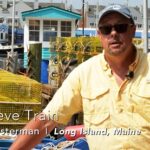 environmental impacts of industrial floating wind on marine life. It’s not a pretty picture. Yet, many large entities whose missions include protecting the environment have given ocean industrialization their blessing. Will they change their minds when they learn the full scope of impact? Video, Click to watch<, Watch the first episode, Road to Disaster – Voices of Maine Lobstermen >click to watch< 11:01
environmental impacts of industrial floating wind on marine life. It’s not a pretty picture. Yet, many large entities whose missions include protecting the environment have given ocean industrialization their blessing. Will they change their minds when they learn the full scope of impact? Video, Click to watch<, Watch the first episode, Road to Disaster – Voices of Maine Lobstermen >click to watch< 11:01
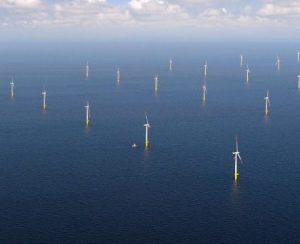
The Maine Fishing community weighs in on offshore wind development
Maine’s fishing community is deeply concerned that wind development will end our fishing heritage, which has sustained coastal communities for centuries and is integral part of Maine’s identity. Without dedicated research proving otherwise, we are skeptical that offshore wind can deliver on its promise of affordable clean energy as promised by global energy companies. “The state of Maine should be wary of trading its fishing heritage by entering a race to fulfill empty promises from international energy companies,” warned Executive Director Patrice McCarron of the Maine Lobstermen’s Association. Wise words from the Executive Director. >click to read< 11:30
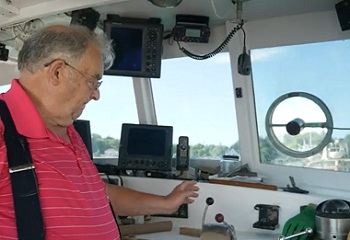
Have a burning question about lobstering? Ask Leroy!
My neighbor, a long-time lobsterman, told me the other day: “There’s this guy you gotta check out, named Leroy. Friend told me about him. On YouTube, old guy like me whose been in the business all his life. He’s answering people’s questions and I hear he’s pretty funny.” He was talking about Leroy Weed, 79, a Deer Isle lobsterman who is getting some statewide and national attention as a spokesman for the lobstering life in an online video series by the Maine Center for Coastal Fisheries, where he answers any and all questions about fishing and commercial fisheries in Maine. The big part of Leroy’s appeal is his dry and cheeky humor. >click to read< 11:01
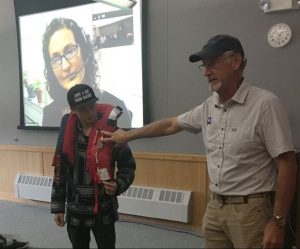
Eastern Maine Skippers event focuses on rapid changes in fishing industry
More than 100 Downeast area high school students gathered at the Schoodic Institute last week as part of the Eastern Maine Skippers Program to learn about these changes. The event was the first of four “cohort” days for the program, in which students from the participating high schools meet one another, hear from industry leaders and begin shaping projects they will work on during the coming school year. “This brings in kids from all these different communities and they get to know each other work together,” said Mike Thalhauser, a fisheries science and leadership advisor with the Maine Center for Coastal Fisheries. >click to read<10:45

Why Maine fishermen may be losing their knowledge of the sea
Maine fishermen have a long history of being involved in fisheries management. Communication between harvesters and policymakers has been instrumental in the development of rules and regulations that have helped to sustain the region’s coastal fisheries—from clams to alewives to lobsters. In part, this success results from the deep understanding of the natural environment held by fishermen. “Local ecological knowledge” is a term used to describe the collective perceptions held by a particular group about their environment, resulting from the transmission of cultural knowledge from one generation to the next, combined with regular and persistent interactions between people and the environment. >click to read<19:47
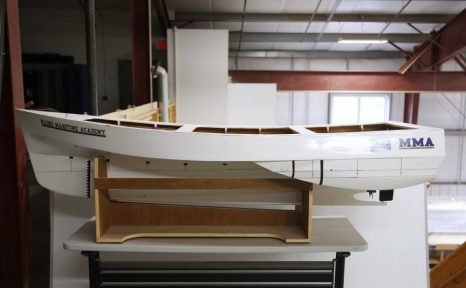
Maine institutions collaborating to build a greener lobster boat
Students at the Landing School have built nearly 400 boats since the school was founded in 1978. But nothing quite like the one the school is about to start on, a 21-foot, ocean-ready test model called a “proof of concept” for what the engineers call a “low-impact commercial trimaran” but which is known colloquially as a “green lobster boat.” “It’s like a skiff on top of a canoe, with two small canoes at the back of the skiff,” said Richard Schuhmann, the president of the Landing School. “It looks like a Batmobile in a way.” That’s the view from bow or stern. In the water and viewed from the side, it will look fairly similar to a classic lobster boat, a shape that conjures up Maine as neatly as a L.L. Bean hunting shoe and, the hope is, meets the desire expressed by many of the lobstermen consulted: that it be “pretty.” From design to materials, this boat is intended to have a smaller carbon footprint, burning less fuel than the busy lobster boats already working in Maine’s waters. click here to read the story, view 8 images 09:34

































